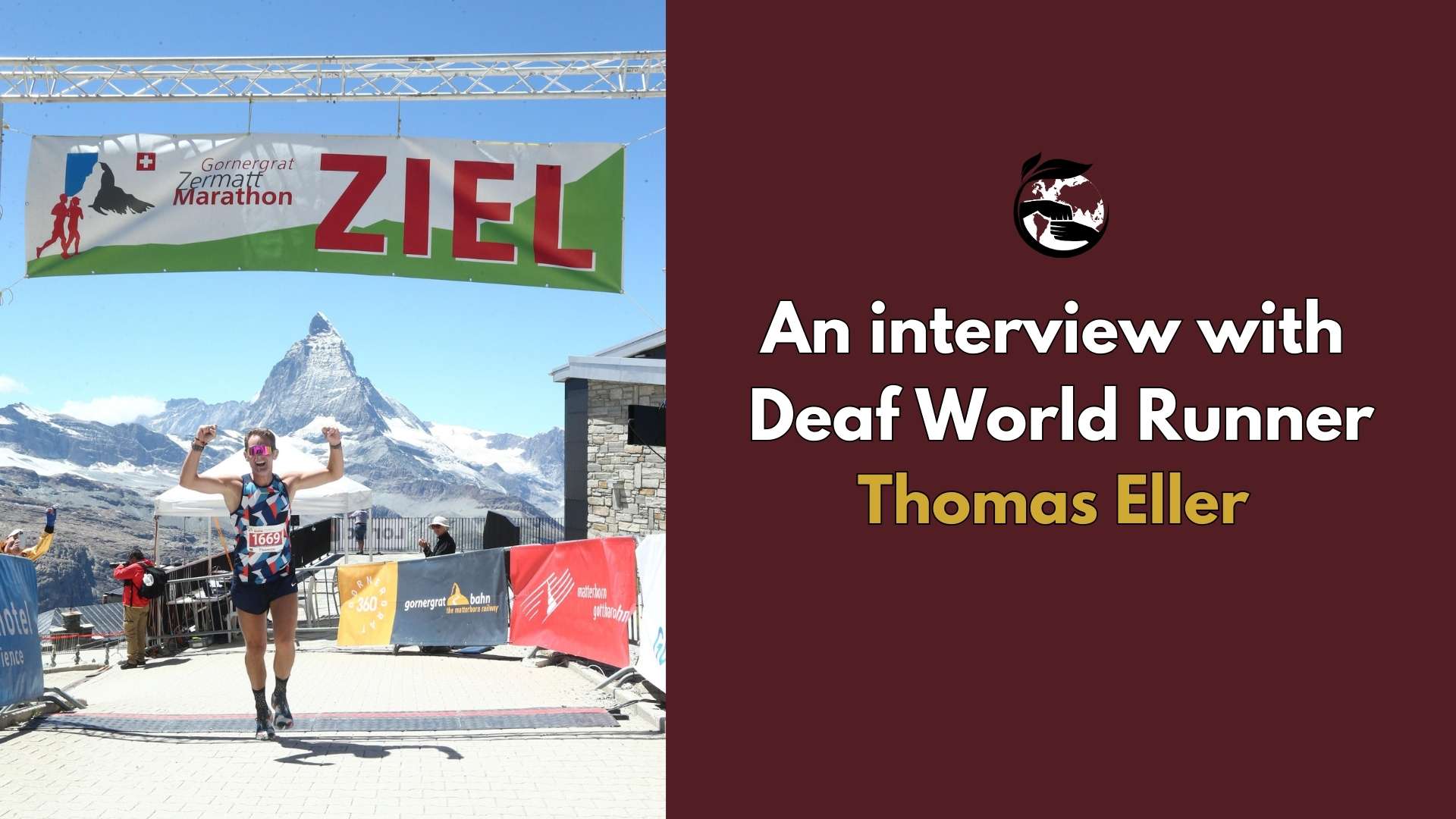(ICS) Tell us about your running background. What inspired you to start running?
(Tom) I am a tennis player turned runner. I played tennis for 30 years, but upon moving to Cologne, Germany for school, I no longer had the time for tennis. I started running 5 to 8 km every other day to stay fit. Four years later, I graduated with a degree in Education and returned to Essen, Germany, my hometown, to teach at the same school I attended as a little boy. I observed many Deaf students who were unhappy with their lives due to the absence of positive Deaf role models. Sharing my travel experiences from visiting other countries, my stories inspired them, and I became someone they could look up to.
(ICS) It’s so important for Deaf children to have Deaf role models! Could you share the story about how you became a marathoner?
(Tom) During a school break, I went out for coffee and encountered a passionate hearing runner who motivated me to start running marathons. While ordering coffee, he noticed me reading a running magazine. When he initiated a conversation, I signaled to him that I am Deaf and rely on lip reading. While chatting, my new friend asked if I would join him in running a marathon. I thought he was joking and I said “yes!”
Shortly after meeting, we started running together regularly. During one of our running breaks, my friend surprised me by announcing that he had booked a marathon journey for us in the desert of Petra, Jordan! He insisted that my first marathon should be in an extraordinary place to make the experience unforgettable. Shocked with my face turning pale at the thought of running 26.2 miles, I declared that I would never run a marathon. However, he didn’t give up on me!
At the age of 38, I ran my first marathon alongside him in September 2018. Surprisingly, I finished fourth, igniting my passion for running. The sight of a first-timer like me securing the fourth position left all the hearing runners in shock!
(ICS) That’s amazing! How did your students react to that exciting news?
When I returned to school, my Deaf students greeted me with sparkling eyes as I opened the classroom door. Having followed my journey on Instagram, they were so proud of me. My achievements inspired them, boosting their self-confidence. I showed my students, through example, that as a Deaf person, you can achieve significant milestones in life and actively participate in the hearing community. My students motivated me to book more marathons and continue my running journey.
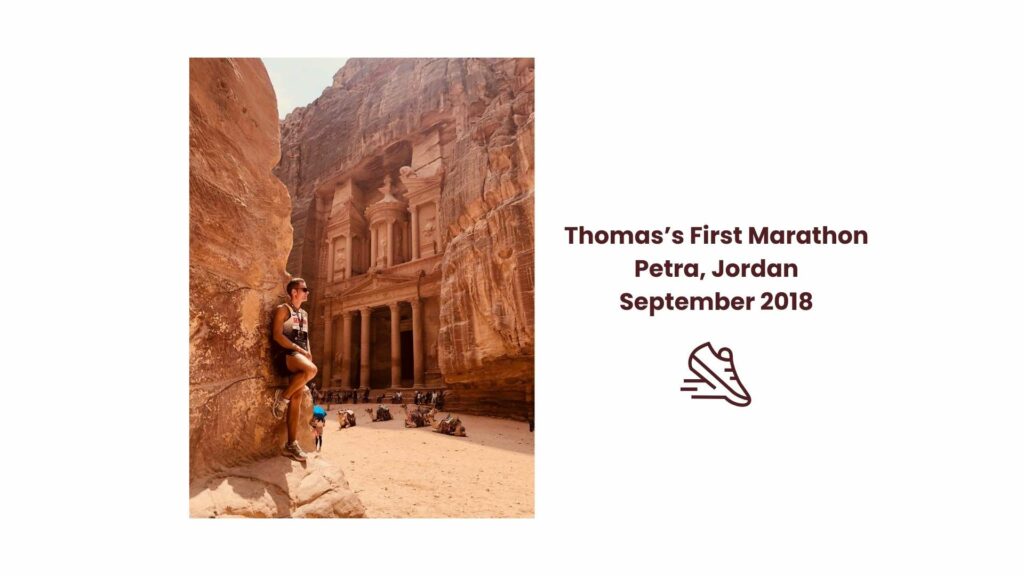
(ICS) To date, what was your favorite marathon and why?
(Tom) That is a difficult question because every marathon journey is unique. However, I’d pick the Milan Marathon in 2019. It’s special to me as it’s where I first achieved the incredible feat of breaking the sub-3 hours barrier. Running a marathon in under 3 hours is a qualifying time for major races like Chicago, Boston, and NYC, the mother of all marathons. Breaking that time was beyond my expectations. With this stunning race result, I earned a spot on the German Deaf Athletics Team and qualified to run the marathon at the Deaflympics (Olympic Games for Deaf people).
(ICS) How does being Deaf benefit you as a marathon runner?
(Tom) Being Deaf provides unique advantages for my performance as a marathon runner. Loud noises aren’t distracting because I can’t hear them. This absence of auditory distractions allows me to maintain heightened focus and concentration throughout races. When I need to calm down one hour before a race starts, I simply close my eyes and recharge myself, tapping into the calm silence around me and listening to the rhythm of my soul. Unlike my hearing running friends, who sometimes struggle with the overwhelming noise of races, I find solace in the serene quietness.
Moreover, being Deaf has enhanced my focus and concentration during races. Without the distraction of external sounds, I can fully immerse myself in the rhythm of my footsteps, allowing me to synchronize my pace and stay attuned to my body’s signals. Deafness has also honed my visual awareness, enabling me to keenly observe the terrain and make swift adjustments to my running technique accordingly. This heightened sensory awareness contributes significantly to my overall performance as a marathon runner.
(ICS) What accessibility challenges, if any, do you commonly encounter as a Deaf runner?
(Tom) As a Deaf runner, I face specific accessibility challenges that stem from the lack of auditory perception. While being Deaf enhances my focus during races, it also poses potential safety risks. I can’t hear sounds such as motorcycles or passing cars, which can be dangerous when navigating the race route. Occasionally, road closures and well-intentioned individuals trying to provide information through yelling go unnoticed, leading to instances where I might take the wrong path. To address this challenge, I advocate for more visual signs during races to ensure the safety and well-being of Deaf runners like myself.
Another accessibility challenge is understanding singers performing the national anthem or loudspeaker announcements, especially when positioned towards the back of the coral. Placing Deaf runners in the front row of the coral would enable us to see sign language interpreters, read live captions, and enhance our understanding of important race information. Increased awareness among fellow runners and race organizers about the unique communication needs of Deaf participants is essential to fostering a more inclusive and accessible environment for all.
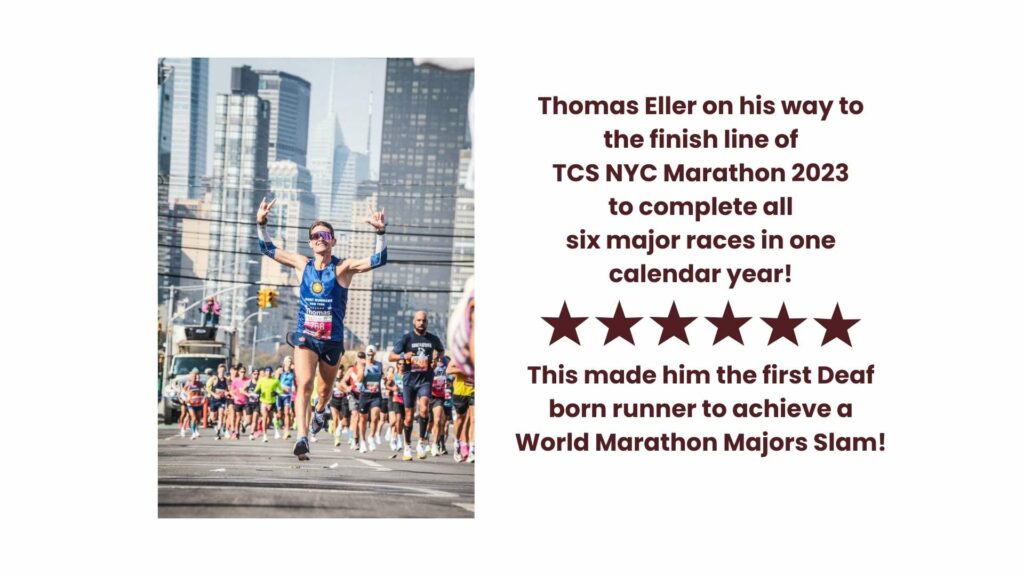
(ICS) What advice do you have for marathon organizers trying to create more accessible races?
(Tom) In striving for greater accessibility, marathons and races can take significant steps to enhance the participation experience for Deaf runners. Here are some key recommendations:
- Schedule sign language interpreters to be available at panel discussions, race course talks, meetings with experts, and opening ceremonies during marathon expos. This guarantees that Deaf participants have access to essential information and can actively engage in the full marathon experience.
- Provide screens that display loudspeaker announcements, ensuring Deaf runners can easily access crucial information at any time during events.
- Include the category “Disability: Deaf” in the race registration process. This would facilitate the identification of Deaf participants, allowing organizers to provide specific information about the location of sign language interpreters, guidance on special tents for Deaf runners, and arrangements for placing Deaf runners with optimal views of accessibility services.
- As a safety measure, every Deaf runner should be assigned an additional bib with their family name on a distinctive background, possibly in turquoise, to represent the Deaf community. This would enhance their visibility to volunteers and race organizers, reducing the risk of potential hazards from race cars, vehicles, and motorcycles.
- Promote inclusivity by providing volunteers with American Sign Language (ASL) or International Sign language lessons. This ensures that race volunteers are equipped with the basic communication skills to interact with Deaf participants, fostering a more inclusive environment.
- Raise awareness about Deaf runners by establishing a separate race category similar to the para division. This allows Deaf runners to compete within their category and be eligible for prizes, acknowledging their unique contributions to the running community.
By implementing these recommendations, marathons and races can create a more inclusive and accessible space, ultimately enriching the experience for Deaf runners and promoting diversity within the running community.
(ICS) Proposing an extra bib to identify Deaf runners is a simple yet impactful suggestion! Thank you for contributing valuable insights to enhance inclusive experiences for Deaf runners. This brings us to our next question: What advice would you give to fellow Deaf runners?
(Tom) To fellow Deaf runners embarking on their own running journeys, I offer the following advice:
Deaf runners shouldn’t be afraid of their hearing counterparts. Through my running experience, I’ve formed numerous wonderful friendships with hearing runners. Every marathon becomes a family meeting, transforming each race location into a gathering where everyone looks out for one another. The running community is filled with incredible encounters and amazing individuals. Some are even eager to learn sign language, showcasing the inclusivity within the community.
Building bridges between the hearing and Deaf communities is essential. I’ve been fortunate to have many supportive hearing friends who step in to assist me when I can’t comprehend loudspeaker announcements or other auditory information. By demonstrating that Deaf runners are integral members of the running community, we contribute to a more inclusive and connected environment.
It’s important to show the hearing community that Deaf individuals are not separate entities but integral parts of the larger community. The more Deaf runners take this initiative, the more inclusive and vibrant the running community becomes. In my experience, the running family is like a patchwork carpet, bringing together individuals from various backgrounds and challenges, all supporting each other. This collective empowerment is the true beauty of the running community.
Helen Keller once remarked that “Blindness separates us from things, but Deafness separates us from people.” I stand as living proof that Keller’s sentiment is not universally true. Deaf runners can actively engage in the hearing community, inspiring not only fellow runners but also Deaf children, teenagers, and adults with their achievements and awareness. Take that first step in the hearing community, and believe me, you will become a source of inspiration for others.
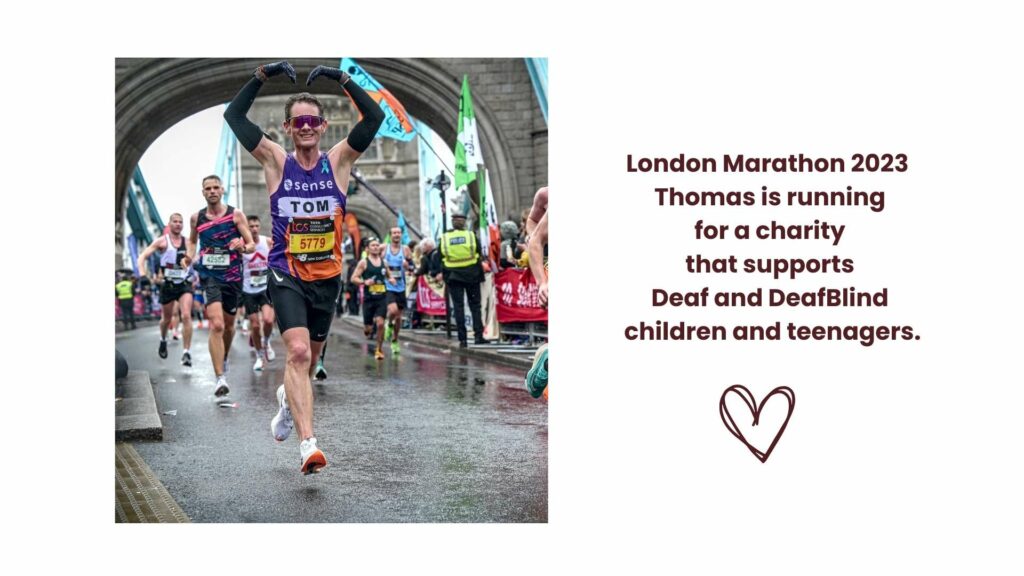
(ICS) You are inspiring us to lace up our running shoes! What are your future goals and plans for 2024?
(Tom) On the personal running front, my plan for the year includes participating in all six major races once again, with Tokyo in March marking the beginning of my journey toward securing a second six-star medal. My primary goal for 2024 is to qualify for my 3rd Abbott Wanda Age Group World Championships in Sydney, Australia, scheduled for September. This prestigious event not only provides me with a competitive platform but also serves as an opportunity to advocate for greater accessibility in the world of marathon running.
Additionally, I aim to serve as an ambassador for Deaf individuals and those with disabilities at the 50th-anniversary celebration of the Berlin Marathon, contributing to the promotion of inclusivity on a global stage. In my continued advocacy efforts, I am dedicated to establishing connections with race directors, emphasizing essential changes that can enhance the participation experience for Deaf runners.
My mission is to make significant contributions to the running community, fostering an environment where Deaf runners feel fully included. My lifetime dream is to see a dedicated race category for Deaf runners in all major races, ensuring full inclusion for this community.
(ICS) Other than traveling and running, what are some of your other passions?
(Tom) I am profoundly passionate about my role as a Deaf teacher. My job brings me immense joy and fulfillment, and my Deaf students consistently inspire me. Ensuring a brighter future for them is a top priority, and I am dedicated to making a positive impact on both the Deaf community and the broader world through my involvement in the running community.
Teaching is more than just a profession; it’s a means to provide Deaf Empowerment and strength to my students. My goal is to contribute to creating a world and a future that surpasses the opportunities available to me.
Cooking serves as a therapeutic outlet for me, providing a way to relax and unwind. During my free time, I also take pleasure in coaching young Deaf athletes, contributing to their growth and development in the realm of sports.
(ICS) Thank you so much Tom for taking the time to chat with us today! Where can our Inclusive Community connect with you?
To the Inclusive Community, please connect with me on Instagram at @deafworldrunnertom! If you are interested in learning more about my story, please check out my video interview with the Abbott World Marathon Majors. Thank you!
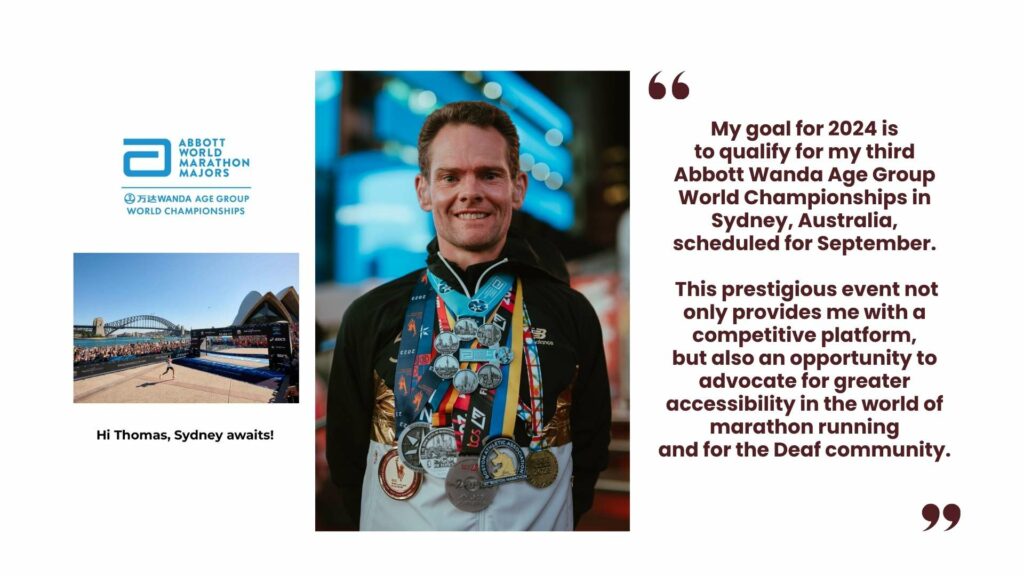
BLOG UPDATE from the Inclusive Team
Following the interview, Tom and the ICS team maintained their connection! The Inclusive Team includes some passionate aspiring runners. A heartfelt congratulations to Tom for earning qualification to the Abbott Wanda Age Group World Championships in Sydney, Australia, scheduled for September.
Inclusive Communication Services extends an invitation to our Inclusive Community to contribute towards the travel expenses for this marathon, supporting Thomas’s advocacy campaign for greater accessibility in the world of marathon running and for the Deaf Community.
Donate to help make Tom’s journey to Sydney and advocacy for accessibility in marathons a reality!
